Key takeaways:
- Swift’s clean syntax simplifies coding, enhancing focus on problem-solving and innovation in Mac application development.
- Learning programming fosters creativity, resilience, and can significantly boost career prospects in a tech-driven world.
- Engagement with community resources like Stack Overflow and structured courses on platforms such as Udemy can facilitate effective learning and collaboration.
- Consistent practice, including small projects and collaboration, greatly aids in mastering new programming languages.
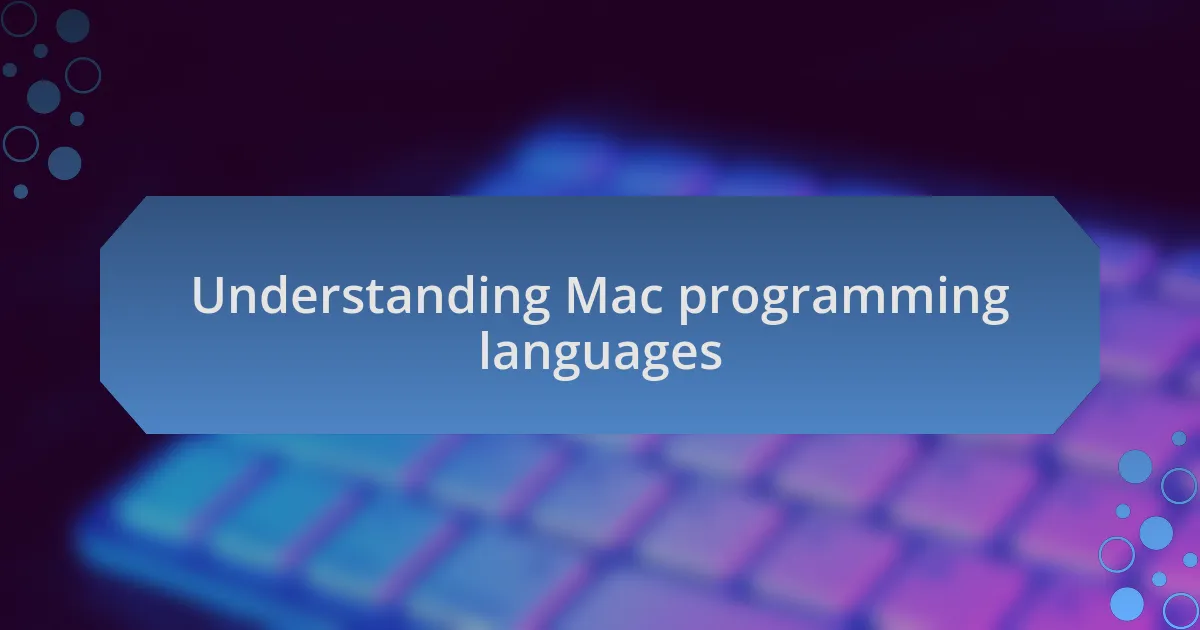
Understanding Mac programming languages
When I first dove into Mac programming languages, I was struck by the elegance of Swift. The syntax felt clean and intuitive, allowing me to focus on problem-solving rather than getting lost in complicated commands. Have you ever encountered a language that just clicked? For me, Swift was that revelation, as it not only simplified coding but also opened the door to developing exciting applications for the Mac ecosystem.
Objective-C is another fascinating language that holds a special place in my heart due to its rich history. I remember feeling a bit intimidated initially, as its syntax seemed more complex with its use of square brackets. Yet, once I adopted the mindset of embracing challenges, I found joy in understanding its messaging system. It’s amazing how a little persistence can transform frustration into an ‘aha’ moment.
Then there’s AppleScript, which introduces a whole new level of life and automation to the Mac. My first experience with automating tasks through AppleScript changed my workflow entirely. I couldn’t help but wonder—what if I could simplify my daily routines with just a few lines of code? The satisfaction that comes with seeing your scripts work seamlessly is truly fulfilling and adds a unique layer of productivity to using a Mac.
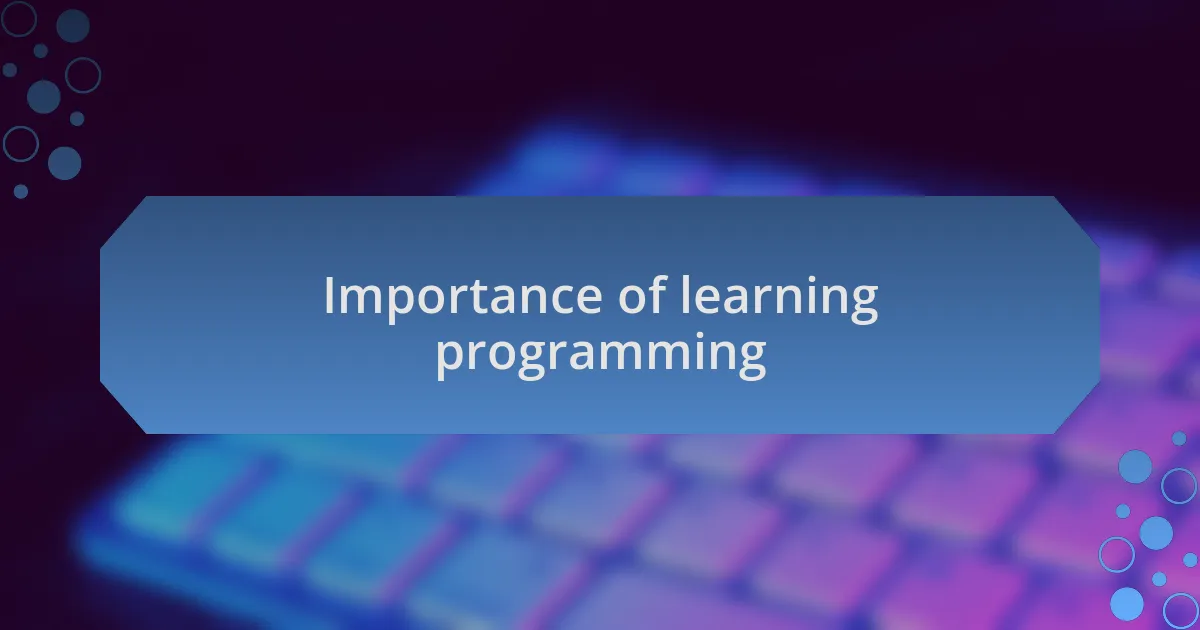
Importance of learning programming
Learning programming is more than just acquiring a new skill; it’s about unlocking endless possibilities for creativity and problem-solving. I remember the first time I built a small app that streamlined my daily tasks. The pride I felt when I saw it work was incredible. Have you ever created something from scratch? That sense of accomplishment can be profoundly motivating.
Moreover, in today’s fast-paced world, programming knowledge is a vital asset that can set you apart professionally. I once applied for a job where the ability to code gave me a competitive edge over other candidates. The realization that I could create solutions, especially in a tech-driven landscape, ignited my passion for continuous learning. Isn’t it fascinating how a few lines of code can elevate your career prospects?
Embracing programming also teaches you resilience. I recall spending days debugging a piece of code, feeling frustrated and questioning my abilities. However, that feeling transformed into a sense of achievement when I finally figured it out. Each challenge made me stronger and more determined. How often do we underestimate our capacity to learn from setbacks? This journey of learning through programming cultivates not just technical skills, but also a mindset that thrives on growth.
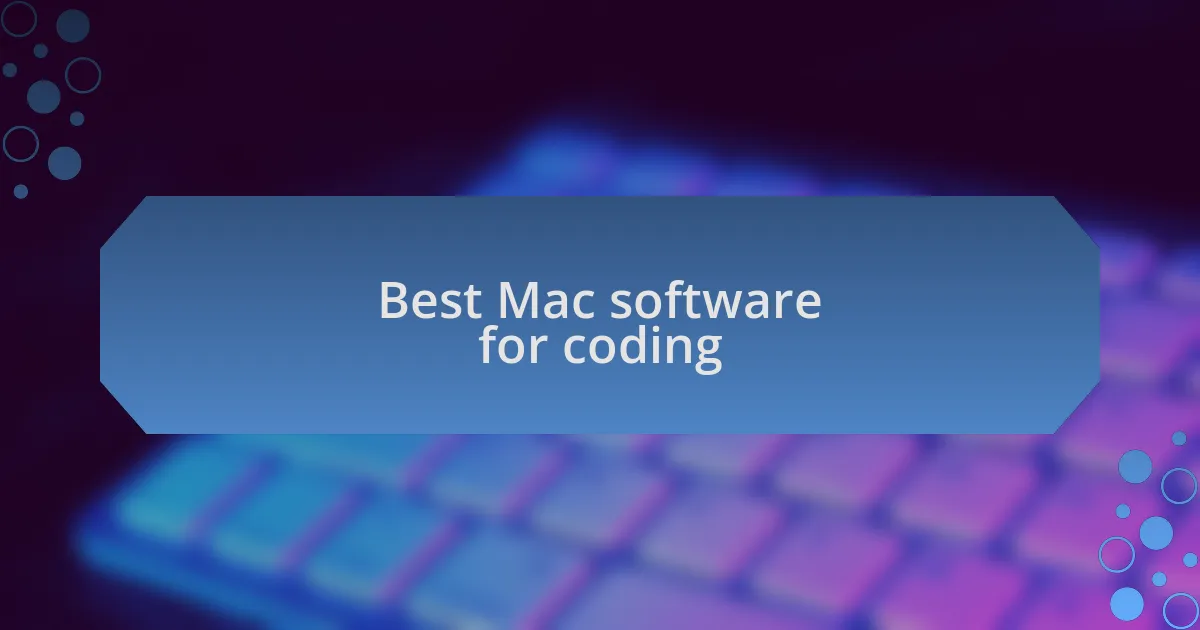
Best Mac software for coding
When it comes to coding on a Mac, I can’t recommend Visual Studio Code highly enough. It’s lightweight yet powerful, making it a joy to use for writing code. I remember the first time I used its IntelliSense feature; it felt like having a supportive coding partner guiding me through my syntax errors. Have you ever had software make your learning curve smoother? That’s exactly what VS Code did for me.
Another fantastic option is Xcode for developers focused on Mac and iOS applications. I vividly recall the thrill of building my first iOS app with its integrated development environment. The interface is user-friendly, but the best part is how the Simulator allows you to test your apps seamlessly. Isn’t it exciting to see your ideas come to life right before your eyes?
For those looking for a more straightforward text editor, Sublime Text is a must-try. Its simplicity is refreshing, yet it still packs a punch with features like multi-line editing and powerful search tools. I found it incredibly helpful when I was revising some complex code, allowing me to navigate through files swiftly without getting bogged down. What’s your go-to tool when you need to streamline your coding process?
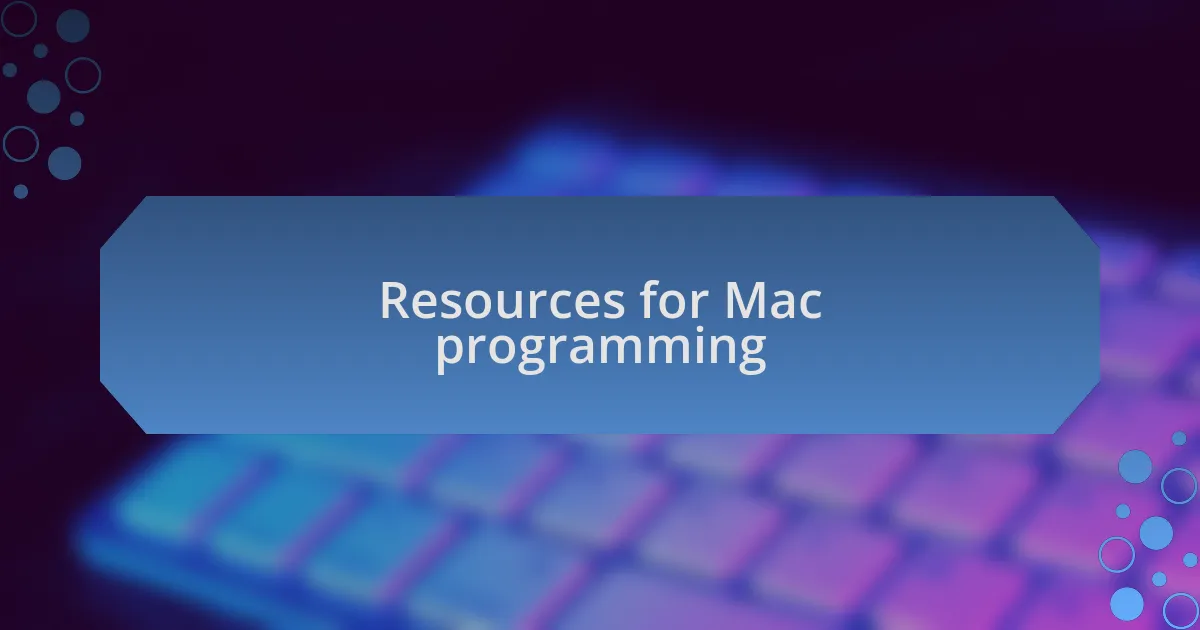
Resources for Mac programming
When it comes to finding resources for Mac programming, I often gravitate towards websites like Stack Overflow. The community there is incredibly supportive, and I fondly remember a time when a simple question about Swift syntax led to multiple answers that clarified my confusion. Have you ever stumbled upon a free resource that just clicked and made everything easier? That’s what Stack Overflow has been for me.
Additionally, Apple’s own Developer Documentation is an indispensable resource for any programmer. When I first started exploring Swift, I spent countless nights diving into the guides and tutorials. The clarity and depth of information available helped me tackle my projects with newfound confidence. Have you ever experienced that ‘aha!’ moment while reading through a well-structured guide?
Lastly, I can’t overlook the wealth of online courses available through platforms like Udemy and Coursera. I recently took a course that not only deepened my understanding of macOS development, but also connected me with other students facing the same challenges. Isn’t it rewarding to share that journey with fellow learners? These platforms transformed my learning experience by providing structured paths to mastery.
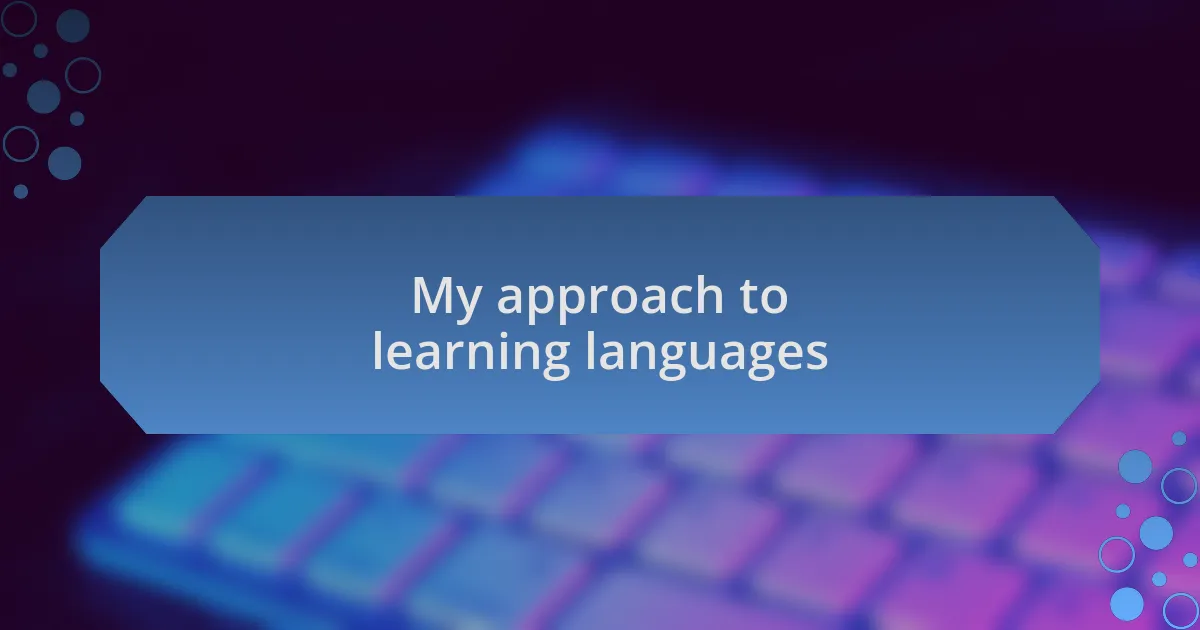
My approach to learning languages
When I dive into learning a new programming language, I usually start with building small projects that spark my interest. For instance, I once created a simple weather app in Python, which not only helped me understand the language but also kept my motivation high. Isn’t it fascinating how real-world applications can make learning feel more relevant and exciting?
I also make it a point to engage with the community surrounding the language. I remember attending a local meetup for Ruby enthusiasts; it was refreshing to share insights and even frustrations with others who were on a similar journey. Have you ever found that discussing your challenges with others can lead to unexpected solutions? That connection makes the learning process much less daunting and much more enjoyable.
Lastly, I believe in the power of consistent practice, even if it’s just for a short period each day. There were weeks when I’d set aside just 30 minutes to code, focusing on different concepts. It surprised me how much ground I could cover in that time. How about you? Do you think small, consistent efforts can lead to significant progress? From my experience, they absolutely can.
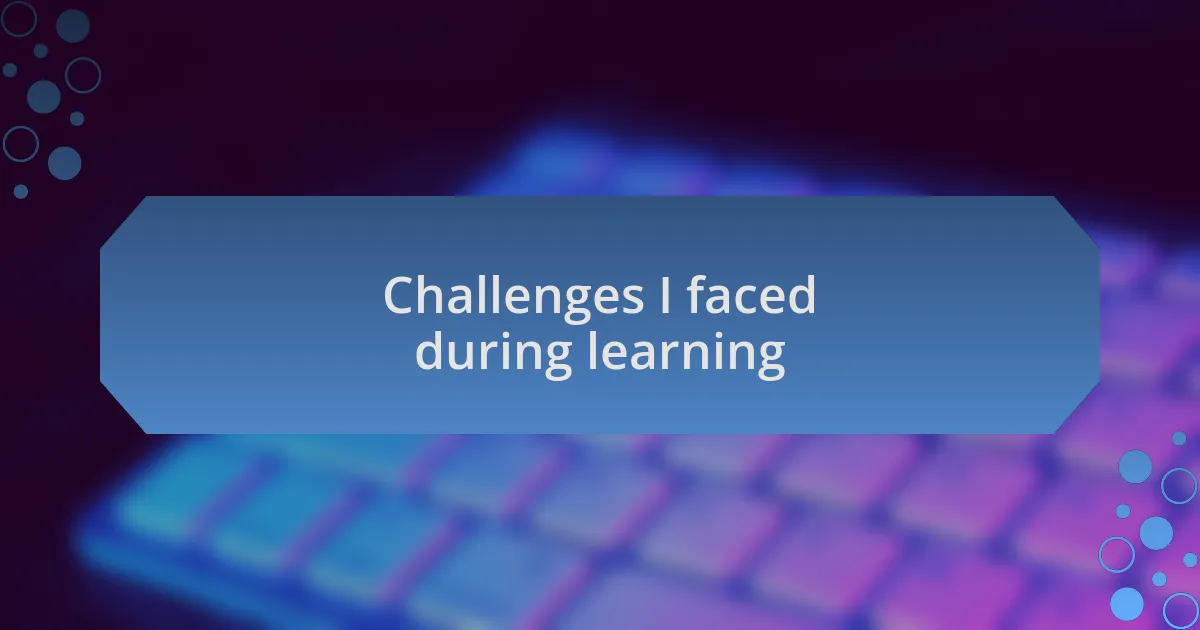
Challenges I faced during learning
Learning new programming languages can be quite a rollercoaster ride, and I definitely encountered my fair share of challenges along the way. For instance, when I started with JavaScript, I often found myself wrestling with asynchronous programming concepts. It felt like trying to solve a puzzle with pieces that didn’t quite fit. Have you ever faced a moment where you nearly gave up because a single topic seemed insurmountable? I remember feeling overwhelmed, but pushing through those tough moments ultimately deepened my understanding.
Another hurdle was grappling with syntax differences between languages. Transitioning from Python’s simplicity to Java’s verbosity made me stumble more than a few times. I vividly recall spending hours troubleshooting what I thought was a simple error, only to find a missing semicolon. Have you ever felt that frustration when even small details can trip you up? This taught me to always slow down and pay close attention to the nuances of each language.
Lastly, time management was a significant challenge. Balancing learning with day-to-day responsibilities often left me feeling scattered. At one point, I realized I was trying to juggle too many projects at once, which led to burnout. Have you felt that pressure to learn quickly? I learned that setting specific goals and focusing on one language at a time not only reduced my stress but also enhanced my retention.
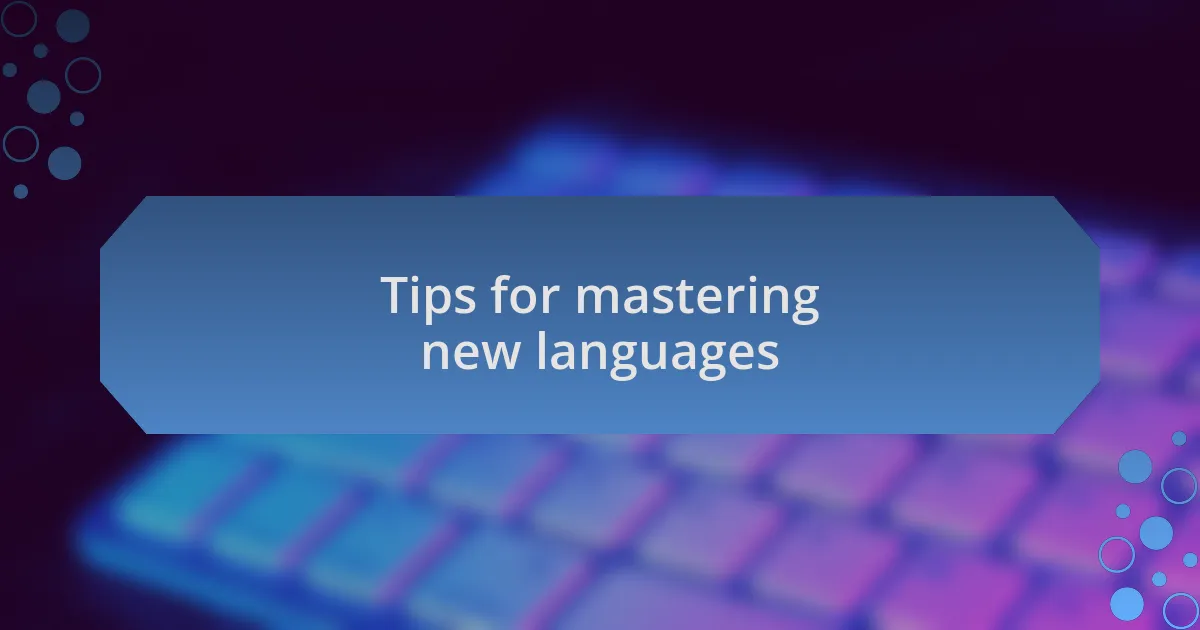
Tips for mastering new languages
When diving into a new programming language, immersing yourself fully can make a world of difference. One technique that worked wonders for me was building small projects right from the get-go. I vividly recall the satisfaction of creating a simple to-do list app in Swift after just a few hours of learning the basics. Have you ever experienced that sense of accomplishment when you’ve built something functional? It’s that feeling that kept me motivated and eager to tackle more complex challenges.
Pairing up with others can also accelerate your learning process. I found participating in coding groups immensely helpful. During a particularly confusing phase while learning Ruby, having a coding buddy to brainstorm with sparked new ideas and solutions I hadn’t considered. Have you had someone guide you through a tricky concept? Collaboration often opens doors to insights that can make the entire learning journey more enjoyable and enriching.
Finally, leveraging online resources can significantly enhance your mastery. I often turned to platforms like Stack Overflow and GitHub when I hit roadblocks. There were times when a simple search led me to discover a workaround for a frustrating problem. Have you ever stumbled upon a resource that just clicked for you? Those moments not only saved me time but also connected me to a larger community of learners and developers who shared my experiences.